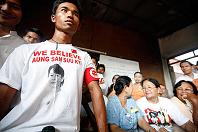
AMRDP chairman Nai Ngwe Thein addresses an audience in Moulmein during the party’s election campaign
Kong Janoi, IMNA : Representatives from the All Mon Regions Democracy Party (AMRDP) are finding that Burmese government surveillance measures are stifling their campaign activities.
According to IMNA field reporters, AMRDP leading organizers Nai Nwe Soe and Nai Baya Aung Moe are being closely monitored by a regional Military Intelligence Unit this week during their campaign in Myiek Township, Tenasserim Division. Witnesses from around Mon State report that that all AMRDP representatives have been followed by the Military Intelligence office in every Township they visit during their campaign, which began in late June.
The party has reportedly been troubled by the Burmese Election Commission’s requirement that all campaign activities be reported to the Commission in advance.
“Last week, when they [AMRDP campaigners] were organizing people in Mudon town, they faced a problem with authorities because they [the AMRDP] informed the [Election] Commission that they would give a speech with two people. In the campaign meeting, when the audience asked a question of their party, one of their members, whose name had not been given to the authorities, talked to the public, so the authorities gave a warning to their party,” a Mudon town witness reported.
“I would like to ask them why pro-junta party like Union Solidarity and Development and Ethnic Unity Party is free to do anything without any restriction from the government,” he added.
Despite pressure from Burma’s military regime, Nai Ngwe Thein, the leader of the AMRDP, believes that the party will ultimately be successful in gaining votes in Mon State.
“We will definitely win the [parliamentary] seat in Mon State if there are free and fair elections, because as far as we know, many people don’t like the pro-junta party. People will only vote to pro-junta party if they feel a threat [from the Burmese government]. We have to explain our people not to afraid to vote to our party,” he explained to IMNA’s field reporters in an interview this month.
According to IMNA field reporters observe situation in Mon State, many people are increasingly enthusiastic about casting their votes in favor of the AMRDP.
Nai Tun, a resident of Mudon Township, said, “Although we see this election is not fair, when the Mon party will come up for elections in our region, we will vote for them because our votes will go only for the Mon Party which we believe will care for our people.”
A political observer from Rangoon named Nai Htaw Mon explained to IMNA that even one member of the AMRDP in Burma’s parliament will likely increase the Mon people’s cultural rights.
“If we look at the Mon culture and literature aspect, it will be freer to learn and teach after the election [if even one AMRDP member is elected]. Politically speaking, if the Mon Party will properly get elected at last, with ten members, what they can do is be a voice in parliament with that amount of people.”
The AMRDP was formed in April 2010; the group is currently the only Mon political group campaigning in Mon State and Mon-controlled areas in the 2010 Burmese elections.





